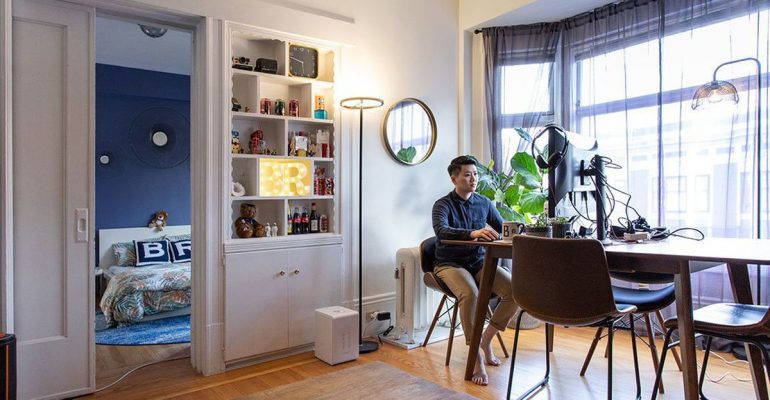Sleep longer, no longer get stuck in commuter traffic, nobody complains about you and can finally regulate the room temperature all by yourself – working in the home office sounds like (work) paradise. What sounds good at first doesn’t always have to work just as well. Some achieve a lot more when working from home than in the office, but there are also pitfalls. That is why we have put together 10 useful tips for the home office, so that you too can fulfill your work-life balance dream.
Get out of your pajamas
And by that we don’t mean that you should sit naked at the PC. Aside from the fact that you shouldn’t wear your pajamas all day long, changing clothes can also help your productivity. Even if you don’t have to go out to work, you should still do so. That means putting on clothes that signal “I’m working now”. In return, the jogging pants can be a sign of relaxation after work. With appropriate clothing, you can also create a routine that can be lost if you spend the whole day at home.
Get off the couch
Speaking of routine: A designated place for work can also help bring clarity to the daily routine. The bed is there for sleeping and the sofa for relaxing, and therefore both are completely unsuitable for productive work. Just as you leave the office in the evening, you should also turn your back on work at home after work. You don’t need an office in your own house for this: a desk that is only there for work and where you can leave your belongings is enough. The main thing is that you separate work and free time at home, because on the one hand you are less tempted to check your e-mails one last time after work or on the other hand to be distracted by the television or the pile of dirty laundry.

Order
Work- uh .. Order is half the battle , and of course that also applies to the home office. If you keep seeing the mountain of dirty laundry mentioned above out of the corner of your eye, it will inevitably distract you. As our study on procrastination found, people particularly like to postpone unpleasant tasks and 17% prefer to clean their desks instead of getting the task over with. If your desk is tidy from the start, you have one less factor that distracts you from your work.
Fixed working hours
Another point in terms of routine is, if possible, to work at the same times as usual or as colleagues in the office. Of course, that depends on your reasons for working from home. But just like you probably have dinner at the same time every day, fixed working hours help to define when you have to work and when not, and to prepare you internally. If you are working on a project with others, it is best to let your colleagues know when you are working and when you will no longer be available. Don’t forget to take a lunch break in the home office and do other relaxing things.
Division of work & communication
Divide up your tasks and set deadlines if you don’t get them from your boss anyway. A (probably not entirely unjustified) prejudice is that “working in the home office” is often equated with “chilling on the couch”. Even if nobody can look over your shoulder at home and nobody checks that you are actually working, you remain accountable with agreed deadlines. Precisely because the home office has this association, a binding work schedule helps to show the superiors that you do your work like your colleagues in the office. Especially if you work from home more often or generally, it is important that you stay in contact with your colleagues and superiors. Team chat software can help, as well as documents that can be edited together in a cloud.
Coworking Spaces
Working in your own four walls is stupid, but working in the office is also not an option? Then try a coworking space. This gives you the feeling of going to the office and you don’t have to be at home alone all day. Often there are different jobs in such facilities, depending on whether you work better with people around you or in complete silence. There are also cafes there for a successful lunch break.









